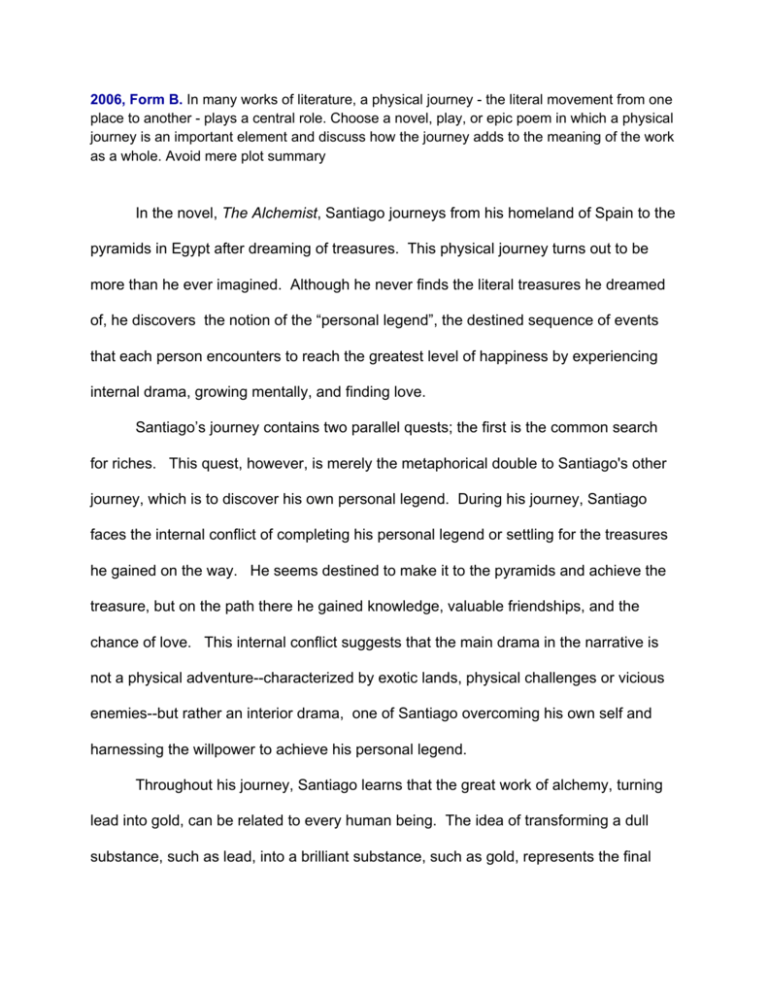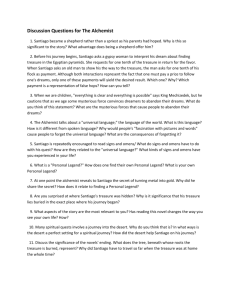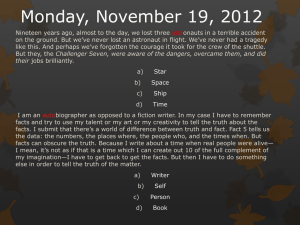In the novel, The Alchemist, Santiago journeys from his
advertisement

2006, Form B. In many works of literature, a physical journey ­ the literal movement from one place to another ­ plays a central role. Choose a novel, play, or epic poem in which a physical journey is an important element and discuss how the journey adds to the meaning of the work as a whole. Avoid mere plot summary In the novel, The Alchemist , Santiago journeys from his homeland of Spain to the pyramids in Egypt after dreaming of treasures. This physical journey turns out to be more than he ever imagined. Although he never finds the literal treasures he dreamed of, he discovers the notion of the “personal legend”, the destined sequence of events that each person encounters to reach the greatest level of happiness by experiencing internal drama, growing mentally, and finding love. Santiago’s journey contains two parallel quests; the first is the common search for riches. This quest, however, is merely the metaphorical double to Santiago's other journey, which is to discover his own personal legend. During his journey, Santiago faces the internal conflict of completing his personal legend or settling for the treasures he gained on the way. He seems destined to make it to the pyramids and achieve the treasure, but on the path there he gained knowledge, valuable friendships, and the chance of love. This internal conflict suggests that the main drama in the narrative is not a physical adventure­­characterized by exotic lands, physical challenges or vicious enemies­­but rather an interior drama, one of Santiago overcoming his own self and harnessing the willpower to achieve his personal legend. Throughout his journey, Santiago learns that the great work of alchemy, turning lead into gold, can be related to every human being. The idea of transforming a dull substance, such as lead, into a brilliant substance, such as gold, represents the final goal of self­improvement. The end goal is reaching greatest happiness and transforming into gold “This is why alchemy exists,’ the boy said, ‘So that everyone will search for his treasure, find it, and then want to be better than he was in his former life. Lead will play its role until the world has no further need for lead; and then lead will have to turn itself into gold.’” (Coelho, 150). On his voyage, Santiago achieved different stages. On the first, he spent a year working at the crystal shop, the second involved his excursion through the desert, the third included his residence at Al­Fayoum, on the fourth, he learned lessons with the alchemist, the fifth resulted in his arrival at the Pyramids and the sixth concluded his journey and the return to the old abandoned church. Through all of these stages, Santiago learned and he matured. He began as a clumsy, frightened boy in an unaccustomed and unfriendly environment, a chunk of lead. As he continued through the stages of his journey, on his way to realizing his personal legend, he progressed until he became gold, “When I have been truly searching for my treasure, I’ve discovered things along the way that I never would have seen had I not had the courage to try things that seemed impossible for a sheppard to achieve,” (Ibid, 130). This personal legend represented a stage of his journey through life that many face. Coelho uses this book to describe the role of love on the journey to the personal legend, "Love never keeps a man from pursuing his personal legend. If he abandons that pursuit, it's because it wasn't true love." (Ibid, 120). Santiago craves love at the novel’s opening as he fantasizes about his next encounter with the merchant’s daughter with whom he spoke briefly the previous year. He is young and alone, and wishes heartily for true companionship, which he hopes to find with the beautiful, raven­haired girl. However, in recounting her reaction to his literacy, she seems limited in her ability to appreciate his desire for something more in life, a passion that is recognized and encouraged by Fatima. Her love is of a different variety, one that encourages him to soar to new heights rather than asks him to clip his wings to stay with her. Fatima expresses her love as a wish to be with Santiago once he has found himself and is ready to share with another. The literal journey from one place to another influenced the figurative journey in which Santiago partook. If it weren’t for the dreams that prompted the voyage, the personal legend that the protagonist achieved would have never occurred. Through this personal legend, he overcame internal conflict, experienced growth, and found love.






